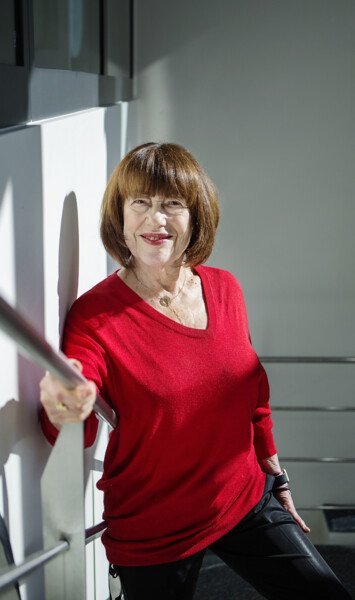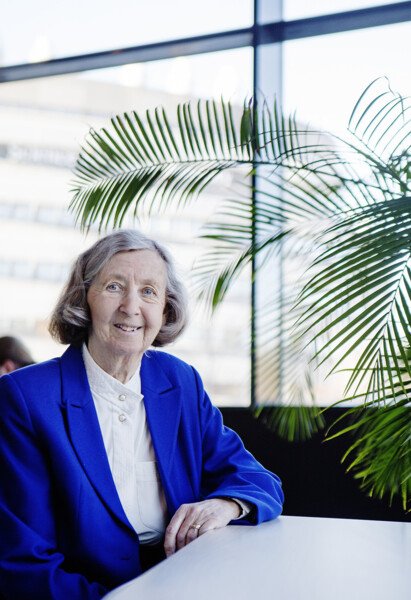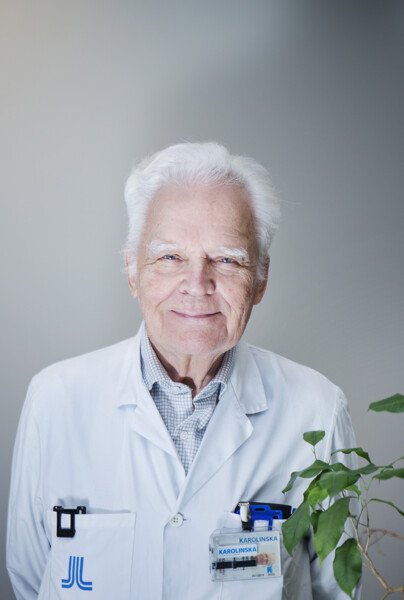Passion instead of pension
In the research profession it is quite common to continue working after your 65th birthday. Meet three researchers at Karolinska Institutet who do not let their age stop them.
“Nothing can beat the daily work meetings”
Name: Anita Aperia
Born: 1936
Title: Professor Emerita at the Department of Women’s and Children’s Health.
Conducts research into: How the body’s most energy-demanding protein, the salt pump, communicates with the kidneys and the brain.

First published in Swedish in the magazine Medicinsk Vetenskap, No 2/2017.
“I cannot think of anything better than going to the lab and working, it has an almost meditative effect. No hobby can beat my daily meetings with other researchers and PhD students. My focus has always been the salt pump, which is present in all cells. As a young researcher, I found that the salt pump in the kidney is less effective in new-born babies, which is why they have problems with their salt balance. My research group also found that the hormone dopamine is produced in the kidney and affects salt balance and blood pressure.
Our most unexpected finding was that the salt pump sends signals into the cells, communicates with the mitochondria, and can prevent the cells from programming themselves to die. Developments in technology have given us tools to work with that I could not have dreamt of as a young researcher and, with them, the prerequisites to understand and to be able to treat diseases have increased vastly. The most paradoxical development is that doctors now have less time to conduct research. I wish it was possible to find a solution to this.
The questions I am working on never leave me alone; and when I wake in the morning and realise that I have the answer to a question - these are the small moments of happiness that drive me, but I react less emotionally nowadays. Often, you believe you have the solution, only to find that is not the case. But is that a catastrophe? No! Conducting good research requires patience, and you acquire that over the years. You have to have realistic goals, and even if the results do not lead to curing a disease, it is a great achievement just being able to slow disease progression.”
“Doing research is unbelievably rewarding”
Name: Gunnel Biberfeld
Born: 1936
Title: Professor Emerita with the Department of Public Health Sciences and the Department of Microbiology, Tumor and Cell Biology.
Conducts research into: Prevention of HIV transmission from mother to child and trials of HIV candidate vaccines.

“I am still working more than full-time with HIV research. My work can save lives and it is unbelievably rewarding. It gives me great satisfaction. I decided to become a doctor when I was only 10 years old. I had intended to become a clinician, but my interest was captured by research. When I was 50, I realised my dream of working in Africa, and since then I have worked continuously with an HIV project, primarily in Tanzania.
My research collaboration with colleagues at the University of Medicine in Dar es Salaam has mostly focussed on preventing the transmission of HIV from mother to child, and trying new HIV candidate vaccines on healthy study volunteers. Our studies have been used in Tanzania as the basis for their national guidelines governing the prevention of HIV transmission from mother to child. Now the risk of infection has dropped dramatically due to life-long treatment of mothers with drugs during pregnancy.
There is still a lot left to do because many mothers do not complete the treatment - mostly because of the stigma attached to HIV. My earlier Tanzanian PhD students are successful in HIV research, and act as supervisors for new PhD students. I see that there is continuity. It is a privilege to conduct research, and it would be hard to accept if I were not able to continue. I hope to be involved in a study where we test the protective effect of HIV vaccines.”
“To continue as before is perhaps naive”
Name: Gösta Gahrton
Born: 1932
Title: Professor Emeritus at the Department of Medicine, Huddinge.
Conducts research into: Stem cell transplants in myeloma, a cancer disease.

“In 1997 I received a letter saying ‘Now you are a pensioner, and you will no longer receive grants from the Swedish Research Council’. I was so angry that I gathered together fifteen professors and wrote a debate article in Dagens Nyheter. That made them think again, and since then that has been changed. I work almost full-time and still travel abroad 20 times a year, just as I have done for the last 30 years.
My career has formed a large part of my identity, but I do also cultivate my leisure interests, I play tennis, hunt and go to the opera. But my research is the most enjoyable thing I do, and I have had very many happy moments. In 1979, my research group published one of the really big discoveries in chronic lymphatic leukaemia. My mentor, Torbjörn Caspersson, had discovered how to separate the chromosomes, and I wanted to see if there were any changes that were specific for the disease that I was studying – chronic lymphatic leukaemia – and we found them!
I took the initiative to start stem cell transplants with donors at Huddinge Hospital; we performed the first one in Sweden on a patient with aplastic anaemia. We also did one of the first in the world with another cancer disease, myeloma. My mentors and supervisors have passed on, and many of my PhD students are pensioners. To continue as before is perhaps naive, I am over 80, but that is what I will do. My goal is still to cure myeloma. I am optimistic."
Text: Maja Lundbäck. Photo: Linda Forsell.
